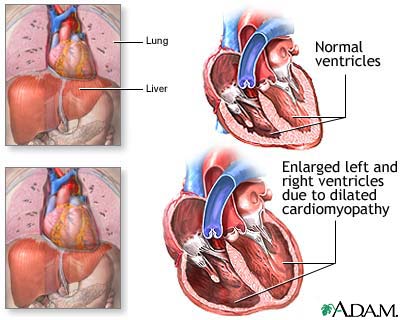
Heart palpitations can be annoying or
scary. They usually are not serious or harmful, though, and often get away on
their own. Most of the time, they're connected to stress and anxiety or to
consumption of stimulants like caffein, nicotine, or alcohol. Palpitations also
usually occur throughout gestation.
In rare cases, palpitations can be a
symptom of a additional serious cardiovascular disease. Therefore, if you have
heart palpitations, make arrangements to see your doctor. And seek immediate
medical attention if on with palpitations, you experience shortness of breath,
dizziness, chest pain, or fainting.
After taking your medical history and
conducting a physical communication, your doctor may order tests that will
either make sure or rule out an underlying cause. If an underlying cause is
found, the right treatment can cut back or eliminate palpitations. If your
palpitations are not associated with an underlying cause, lifestyle changes,
including stress management and the dodging of common triggers, can facilitate
stop them.
Causes of Heart Palpitations
Many things will cause heart
palpitations. In the overwhelming majority of cases, the cause is either
related to your heart or is unknown. Non-heart-related causes of palpitations
include:
- Strong emotions such as anxiety, fear, or stress; palpitations often occur throughout panic attacks.
- Vigorous physical activity
- Caffeine, nicotine, alcohol, or illegal street medicine such as cocain and amphetamines
- Medical conditions, including thyroid sickness, a low glucose level, anemia, low blood pressure, fever, and dehydration
- Hormonal changes throughout period, pregnancy, or the perimenopausal period; sometimes, palpitations during maternity ar signs of anemia.
- Medications, including diet pills, decongestants, asthma inhalers, ANd some drugs accustomed stop arrhythmias (a serious regular recurrence problem) or treat an hypoactive thyroid
- Certain flavourer and nutritionary supplements
- Abnormal electrolyte levels
- Some people expertise palpitations when ingestion serious meals that ar made in carbohydrates, sugar, or fat. Sometimes, eating foods with high levels of monosodium salt (MSG), nitrates, or sodium will bring them on.
If you have heart palpitations after
ingestion sure foods, the problem may well be food sensitivity. Keeping a food
diary can facilitate you establish that foods to avoid.
Palpitations can additionally be
associated with underlying cardiovascular disease. When they ar, palpitations
are additional seemingly to represent cardiopathy. Heart conditions associated
with palpitations include:
- Prior heart attack
- Coronary artery disease
- Other heart issues such as symptom coronary failure, heart valve problems, or heart muscle problems.
Your doctor will conduct a physical
examination, take your medical history, and ask concerning your current
medications, diet, and lifestyle. The doctor also can raise once, how often,
and under what circumstances palpitations occur.
Sometimes, a blood test will reveal the
presence of anemia, electrolyte issues, or thyroid abnormalities and help
establish the cause of palpitations. Other helpful tests include:
- Electrocardiogram (ECG). An graphical record will be done either whereas you're at rest or whereas you're workout. The latter is called a stress graphical record. An graphical record records your heart's electrical signals and will discover abnormalities within the heart's rhythm.
- Holter monitoring. A Holter monitor is worn on the chest. It continuously records your heart's electrical signals for twenty four to forty eight hours. It can discover rhythm abnormalities that weren't known throughout a regular graphical record take a look at.
- Event recording. An event recorder is worn on the chest. You use a handheld device to record the heart's electrical signals once symptoms occur.
- Chest X-ray.
- Echocardiogram. This is an ultrasound examination of the center. It provides detailed info concerning the heart's structure and perform.
- If necessary, your doctor may refer you to a specialist for extra tests or treatment.
Treatment of Heart Palpitations
Treatment of heart palpitations depends
on their cause. In most cases, palpitations are found to be harmless and
typically flee on their own. In those cases, no treatment is needed.
If palpitations are not as a result of
an underlying condition, your doctor may advise you to avoid the things that
trigger them. Strategies could include:
Reducing anxiety and stress. Common
stress-reducing therapies include relaxation exercises, yoga, tai chi,
biofeedback, guided mental imagery, and aromatherapy.
Avoiding certain foods, beverages, and
substances. This may embody alcohol, nicotine, caffeine, and illegal medicine.
Avoiding medications that act as stimulants.
These include cough and cold medicines, and certain flavourer and nutritionary supplements.
If lifestyle changes fail to cut back or
eliminate palpitations, your doctor may visit sure medications. In some cases,
beta-blockers or calcium-channel blockers are used.
If your doctor finds that your
palpitations are connected to an underlying condition, such as anemia, the
focus are going to be on treating that condition. If the palpitations are
caused by a medication, your doctor will attempt to notice another medication
you'll be able to use. If the palpitations represent an cardiopathy,
medications or procedures may be needed. You may even be spoken a regular
recurrence specialist called an electrophysiologist.




